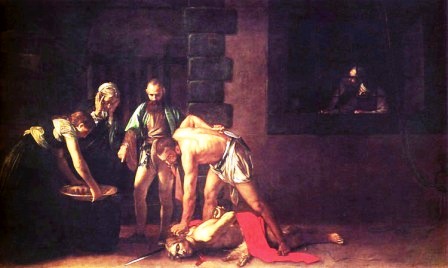 Today is the feast of the Beheading of John the Baptist.
Today is the feast of the Beheading of John the Baptist.
I consider this (also) my name day, and in so many ways it is more appropriate for me than the Nativity of John in June.
Here is the Roman Martyrology entry for ” the greatest man born of woman”, as the Lord called him:
Memoria passionis sancti Ioannis Baptistae, quem Herodes Antipas rex in arce Macherontis in carcere tenuit et in anniversario suo, filia Herodiadis rogante, decollari praecepit; ideo, Praecursor Domini, sicut lucerna ardens et lucens, tam in morte quam in vita testimonium perhibuit veritati.
…
The memorial of the suffering and death of St. John the Baptist, whom King Herod Antipas held in the prison in the citadel of Macheron and, on his birthday, since the daughter of Herodias was making the request, ordered to be beheaded; thus, the Precursor of the Lord, like a bright shining lantern, gave witness to the truth in death as much as he did in life.
![]()
There is a tradition that John was forgiven the guilt of Original Sin before He was born, at the sound of Mary’s voice when she came to visit Elizabeth and John lept in her womb.
St. Augustine spoke often of St. John the Baptist, “the voice” of Christ’s “Word”.
Here is a piece of s. 380, preached in a year we can’t quite figure out. As a matter of fact, it might not be an actual sermon, but something assembled from other pieces. Still, it is Augustinian:
8. So let us recognize these two things in the very differences of [Christ’s and John’s] deaths. We read that John suffered martyrdom for the truth; was it for Christ? It wasn’t for Christ if Christ isn’t Truth. It certainly wasn’t for His Name, and yet it was for Truth itself. I mean the reason John was beheaded, after all, was not that he had confessed Christ. But he was urging self-control, he was urging justice; he was saying, “It is not lawful for you to have your brother’s wife” (Mk 6:18). The law, you see, which had commanded this, had also commanded about those who died without children, that brothers should take the wives of their brothers, and raise up seed for their brothers. Where this reason was lacking, the only motive was lust. It was this lust that John was rebuking, a chaste man rebuking an incestuous one; because this too is what he represented: “It is necessary for him to grow, but for me to diminish” (Jn 3:30).
The commandment had already been given that if anyone died without seed, his closet relation should take his wife and raise up seed for his brother. After all, why had God commanded this if not to signify in this way that the brother’s seed was to be raised up to the brother’s name? The commandment, you see, was that the child to be born would have the name of the deceased. Christ was deceased, the apostles took His spouse, the Church. Those whom they begot of her they did not name Paulians or Petrians, but Christians.
So let both their deaths also speak of these two things: “It is necessary for him to grow, but for me to diminish.” The one grew on the Cross, the other was diminished by the sword. Their deaths have spoken of this mystery, let the days do so too. Christ is born, and the days start increasing; John is born, and the days start diminishing. So let man’s honor diminish, God’s honor increase, so that the honor of man may be found in the honor of God.
Augustine makes the connection between the change of seasons and the births of John the Precursor and Christ the Messiah. Very nice.
In nature, in the northern hemisphere, the days are now quite obviously getting shorter, a cycle reflected in our feasts.
Finally, I am amused by the fact that the dictionary.com “word of the day” today is “truncate”.

 The commandment had already been given that if anyone died without seed, his closet relation should take his wife and raise up seed for his brother. After all, why had God commanded this if not to signify in this way that the brother’s seed was to be raised up to the brother’s name? The commandment, you see, was that the child to be born would have the name of the deceased. Christ was deceased, the apostles took His spouse, the Church. Those whom they begot of her they did not name Paulians or Petrians, but Christians.
The commandment had already been given that if anyone died without seed, his closet relation should take his wife and raise up seed for his brother. After all, why had God commanded this if not to signify in this way that the brother’s seed was to be raised up to the brother’s name? The commandment, you see, was that the child to be born would have the name of the deceased. Christ was deceased, the apostles took His spouse, the Church. Those whom they begot of her they did not name Paulians or Petrians, but Christians.




























In the OF, this is now called “The Passion of St. John the Baptist,” in place of “The Martyrdom of St. John the Baptist.” One of the small changes in the new translation.
When quite young, one of the boys at school brought in one of those children’s illustrated Bibles which the teacher promptly used as a teaching aid, this being easy since the illustrations showed such intensely rivetting subjects (for boys) as the martyrdom of the Maccabees and… the beheading of St. John, head on the plate, gory sword etc etc. In turn this prompted me to ask my mother which St. John I was named after. “Neither”, she replied, “you were named after your grandfather”. “Oh, o.k. ” I said, or words to that effect, and promptly forgot all about it.
She had a quite cynical sense of humour. She used to remind me of this in later years. But I never did find out which one I was named after.
It’s interesting to me that John the Baptist was beheaded essentially for defending the institution of marriage, and I wonder if there won’t be similar consequences for those who support traditional marriage in the near future.
Happy Name Day, Fr. Z!
Fr. Z., thank you for sharing this beautiful piece from St. Augustine!
When I first found your blog, I would jump over your WDTPRS posts, as well as the beautiful posts about the saints, with the pieces from the Roman Martyrology and Church Fathers; I would go right for the juicy stuff about the Magisterium of Nuns and the “culture wars” in the U.S.
I now find myself doing almost the opposite. I still like the other posts, and they are most certainly important issues; yet, now I find myself skimming over them quickly just to get the basic news, and sometimes even skipping them altogether in favor of this kind of post. (Ideally, I would like to read everything you write carefully, but since my time is not unlimited, I think I’m now choosing more wisely.)
More and more, I appreciate the beauty of the commentaries on the lives of Saints, the analyses of the collects and other prayers and the posts about Gregorian Chant and the like. A few Sundays back, having read your commentary on the collect, I listened to it in a way that I have never listened to it before; it was full of meaning and clarity, and sounded far more beautiful than I remember other collects.
Thank you, again! I’ll be back to read this one on the Beheading of St. John again later on today.
… and Happy Name Day too!
Pingback: WEDNESDAY EVENING EDITION | Big Pulpit
Joy on your name day, Father.
At this very moment my dad is undergoing brain surgery to remove a cancerous tumor (any prayers would be appreciated). I was not very enthusiastic when I found out about this being the feast of the beheading of John the Baptist, although my Dad thinks its kind of funny. Dad’s sense of humor is still functioning just fine.
@Mom2301: He will be in my night prayers!
Last night’s free outdoor MET Opera HD broadcast: Salome.
The MET knows the Roman Calendar, that’s for sure…